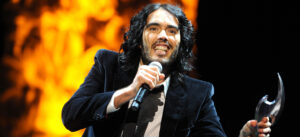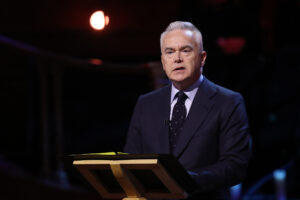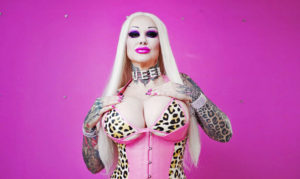Back in the Noughties, pop culture was hard and nasty. The internet was corroding the mystique of fame, and the public wanted to read — in the words of Jessica Callan, one of The Mirror’s original 3AM Girl gossip columnists — about “fighting and fucking”. It was a period of viciousness and excess, where cruelty was the norm and misogyny was celebrated. And Russell Brand was at its centre. He didn’t fight. But as a self-confessed sex addict, he fucked a lot, and he talked a lot about fucking in his comedy act.
This was a time when invasion of privacy was de rigueur. Sex tapes made headlines, and no one considered whether their subjects wanted them in public or not. Phone hacking made headlines, too, although journalists rarely admitted in public that this was how they got their stories. Brand, who appeared to have no boundaries at all, was perfectly adapted to the demands of this environment.
Lad culture, which had once seemed like a corrective to smothering Nineties niceness, flourished into a full backlash. Second-wave feminism had spent decades explaining why porn, objectification and rape jokes should be unacceptable. Now they came surging back, this time with a protective sheen of irony.
On stage and on screen, Brand broke taboos that were already being pushed to breaking point by the indecency the internet was feeding into every home. In stand-up footage from 2006, Brand talks about liking “them blow jobs where it goes in their neck a little bit… them blow jobs where the mascara runs a little bit”. He was talking about the “choking blowjobs” that were being mainstreamed by gonzo porn.
He was also telling us about his own sexual preferences, according to one of the women interviewed by The Sunday Times. She met Brand the same year that he performed that set, when she was 16 and he 31. Towards the end of their relationship, she alleges that he sexually assaulted her by forcing his penis down her throat; after she fought him off, he told her he had “only wanted to see your mascara run”. (Brand denies committing any criminal acts.)
It wasn’t just his predilections that made Brand right for the Noughties. It was also his talent for making himself into an easily recognised caricature: the priapic man-child with the dandyish wardrobe and the sky-high hair. A cartoonish distillation of Byronic swagger and Kenny Everett nerve. Amy Winehouse was probably the only figure with a more distinctive iconography, and people would sometimes joke that they looked alike.
But such cartoonishness could serve another purpose. Maya Angelou wrote: “When people show you who they are, believe them.” But what if someone shows you a version of who they are that is so extreme that taking it seriously would be tantamount to missing the punchline? In the Noughties, there was no bigger faux pas than missing the punchline. Playing an overblown version of the predator can be an actual predator’s most effective camouflage.
Fashion photographer Terry Richardson defined the raw, hypersexed look of the Noughties in his work for high-end brands and glossy magazines. He claimed his mission was to bring out the “inner porn star” of his subjects (one of his subjects was Barack Obama, who was campaigning for the Democratic nomination at the time). But models claim the “consensual” sex acts he photographed himself performing on them were nothing of the sort. Richardson was dropped by the fashion industry after these allegations, which he denies, were reported in 2017.
When RnB star R. Kelly was indicted for child pornography charges in 2002, he responded, not by purging sex from his music, but by amping it up to preposterous levels, nicknaming himself “the pied piper of RnB”. The music was “scandal-proof”, concluded comic Dave Chappelle in a stand-up segment, because everything that could shock you about Kelly was already in full view. (Kelly was cleared of the initial charges, but convicted of multiple sexual offences against women and girls in later trials.)
This gambit was not a new one. Jimmy Savile had pioneered it, clanking his chains and puffing his cigars and teasing about the things he’d like to do to schoolgirls. (In a radio interview with Savile from 2007, Brand crawlingly begged to meet “Sir Jimmy” and offered to bring along his female assistant, naked.) But the Noughties veneration of knowingness made it extraordinarily effective.
The no-holds-barred tabloid culture at that time took power away from many female celebrities: invasive tactics meant they had little means of bargaining with the media. But the premium on fame served other public figures well, and someone like Brand was in a position to exercise exceptional control.
That would ultimately contribute to one of his greatest disgraces, when Brand and Jonathan Ross phoned the actor Andrew Sachs during their Radio 2 show and left a voicemail saying Brand had “fucked your granddaughter”. It was ugly and misogynistic, and unforgivably the BBC broadcast it. There were mass complaints, a £150,000 Ofcom fine, and the controller of Radio 2 was forced to resign. Ofcom found that Brand had benefited from a culture of extreme licence, where “the presenter’s interests had been given greater priority than the BBC’s responsibility to avoid unwarranted infringements of privacy”. When you’re a star, you can do anything, as a man who would be president said in the Noughties.
Brand had his defenders, though. He cultivated a boyish vulnerability that sweetened the corruption. In the remake of Arthur (2011), he takes the role of the eponymous playboy and Helen Mirren plays his lifelong nanny. “He’s merely shaped like an adult,” she tells one of Arthur’s conquests. Mirren extended that indulgence to Brand’s real-world behaviour. “Sachsgate,” she said, had been merely “naughty… schoolboy kind of behaviour”. He was 33 years old at the time of the incident.
Brand would soon be reaching for a more grown-up persona: political activist. His verbal dexterity had always given him a cachet other tabloid regulars did not enjoy: The Guardian used him as a columnist for many years. He guest-edited an issue of The New Statesman. He supported Occupy Wall Street. He wrote a book called Revolution. But Brand’s political awakening did not seem to include a reconsideration of his attitude to women.
In his material, women still appeared as decorative objects or dangerous temptations: things to be used, or a substance to abstain from. Having caused a minor scandal at the GQ Awards by joking about sponsor Hugo Boss making uniforms for Nazi, he described the event in The Guardian as a microcosm of corporate influence and political corruption, thronging with “birds in frocks of colliding colours that if sighted in nature would indicate the presence of poison”.
Though he railed against oppression and exploitation, there were no signs that he was particularly egalitarian in his private life. “At first when I met him he wanted an equal, and I think a lot of times strong men do want an equal, but then they get that equal and they’re like: ‘I can’t handle the equalness’,” Katy Perry told Vogue after the couple divorced in 2011. “It was very controlling.”
Brand retaliated with a stand-up riff about Perry being so boring in bed: “I’d be having sex thinking: ‘Think of anyone, anyone else’.” This did little to damage the perception that Brand was not only of the Left, but an asset to the cause. Nor did Sachsgate damage him, nor did Brand’s history of fantasising on-stage about making women cry during sex. Misogyny has rarely disqualified a man from being a socialist hero.
George Monbiot nominated Brand as his “hero of the year” in 2014. “Brand’s openness about his flaws makes him a good leader, and allows those who admire him to be good followers,” wrote Monbiot. “He’s the best thing that has happened to the Left in years.” But Brand’s “openness about his flaws” did not mean he was reformed. It was a strategic move to flannel those who were naive enough to confuse confession with salvation.
In 2015, Brand endorsed Ed Miliband (after previously telling his followers not to vote). “Russell Brand has endorsed Labour — and the Tories should be worried,” was the headline on an Owen Jones column. Brand returned the favour by blurbing Jones’s book The Establishment: “Owen Jones… is our generation’s Orwell and we must cherish him.” The Tories did not need to worry, of course. They won the general election.
But then, Brand’s pivot to politics has always had more to do with his own self-importance than with any interest in effecting actual change. His videos draw viewers down the rabbit hole: their success is in inspiring people to watch even more Russell Brand videos, endlessly clutching at an understanding that Brand, now in full-on messiah mode, promises will soon be revealed to his “awakening wonders”.
It is too optimistic to say that no one in broadcasting or comedy today could do the things of which Brand is accused. (The allegations of workplace sexual harassment against Dan Wootton, which Wootton vigorously denies, should warn against complacency.) It would, however, probably be harder. Unlike in the Noughties, production staff would be less inclined to turn a blind eye. Runners and assistants would be more likely to refuse to act as procurers, if asked.
A predator looking for a niche would probably not now make DJing or presenting or stand-up their first choice. A predator today would choose to be a social-media influencer: outside restraining power structures, with a direct line to their fans. A medium that allows you to groom thousands of people all at once, inculcating them into a secret world they share with you.
Brand’s transition from mainstream celebrity to conspiracist YouTube guru is perfectly in line with the way fame has evolved. He has always had a talent for turning people into “good followers”, as Monbiot correctly noted. The self-aware degradation of the Noughties in which Brand’s career thrived looks shamefully dated now, but those who hunger for power will always find new avenues to exploit.
Disclaimer
Some of the posts we share are controversial and we do not necessarily agree with them in the whole extend. Sometimes we agree with the content or part of it but we do not agree with the narration or language. Nevertheless we find them somehow interesting, valuable and/or informative or we share them, because we strongly believe in freedom of speech, free press and journalism. We strongly encourage you to have a critical approach to all the content, do your own research and analysis to build your own opinion.
We would be glad to have your feedback.
Source: UnHerd Read the original article here: https://unherd.com/





